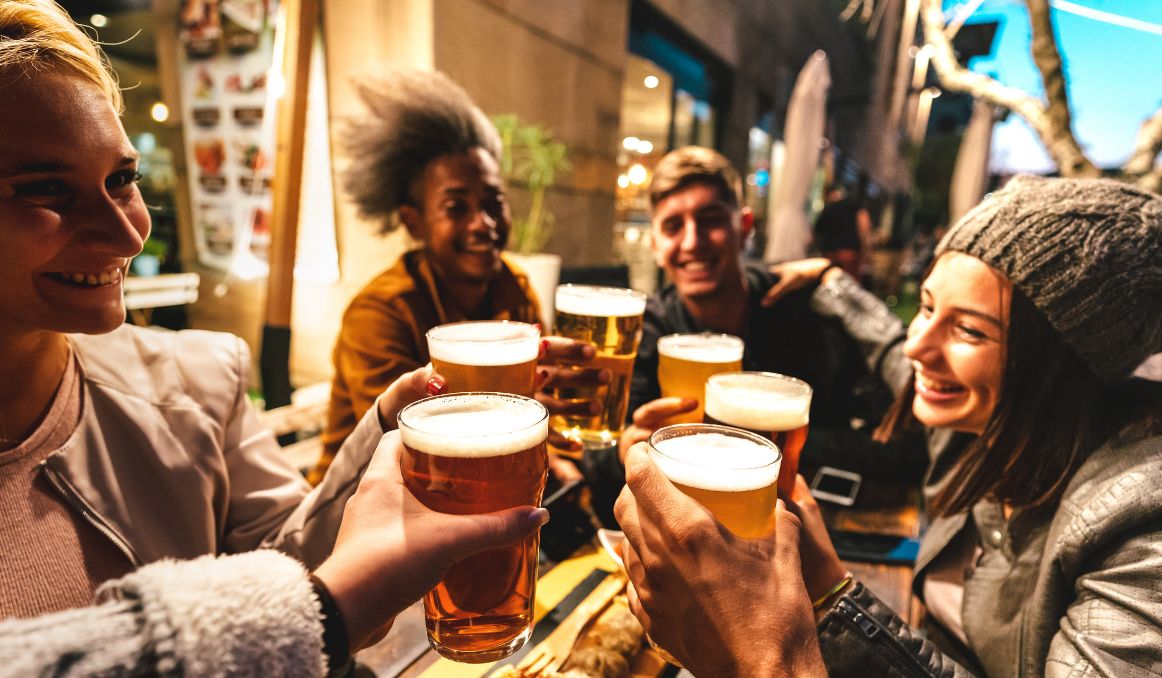Why Beer Doesn’t Give You a Hangover: Your Body on Beers
It’s an ongoing conversation between friends and family, between brewers and vintners. We’re all trying to figure out why beer doesn’t give you a hangover.
Or, at least why some people say beer doesn’t give them a hangover.
And really, the truth is, drink enough beer and it will give you a hangover.
So what we’re talking about here is alcohol content, and the differences between various forms of alcohol, from red wine to whiskey or vodka to beer.

What Is a Hangover?
The first thing that can be helpful to figure out why beer doesn’t give you a hangover, or at least not a bad one, is to understand what a hangover even is.
In basic terms, a hangover is the way your body reacts when it has been depleted of its energy sources.
A severe hangover can include your body rejecting an excessive amount of toxins.
Some people have sugar hangovers or hangovers to other substances that are full of chemicals.
And pretty much anyone who has experimented with too much alcohol in their younger days has experienced an alcohol hangover.
Alcohol
In general, all forms of alcohol are toxic to the human body.
It affects your immune system, your skeletal system, your reproductive system, your circulatory system, your digestive system, your central nervous system, and your excretory system.
Basically, it interferes with your body’s ability to function at all levels.
When you have a drink of any alcohol, it passes quickly into your bloodstream and travels to every part of your body, affecting your brain first, then your kidneys, lungs, and liver.
Thus, when you have a single drink, it affects your whole body.
One of the biggest things in the immediate that alcohol does to our bodies is to dehydrate them.
The liver will oxidize 95% of alcohol you drink, converting it to water and carbon monoxide, but it can only do so at one unit of alcohol per hour. Every additional unit with overwhelm your system, which in turn will treat alcohol like a poison.
Thus, the morning after you have been drinking, you will feel headachy, tired, and even nauseous to the point of vomiting, depending on what you have had to drink.
All of these feelings are the result of inflammation, the swelling your body undergoes when it is working to heal itself. All pain is a result of inflammation, and all inflammation is your body trying to heal itself.
Long term effects of excessive drinking include liver damage, heart disease, cancer, dementia, and even tuberculosis.
The good news is that drinking in moderation, one drink per day for women and two per day for men, has not been shown to come with long term health problems, and there has even been some evidence that the occasional drink can have some health benefits.
Especially when it comes to beer.
Beer and Hangovers

Whereas wine is fermented grape juice, which is essentially grapes turned into alcohol by yeast, and all spirits are distilled alcoholic beverages that have been concentrated to increase the potency of the drink, beer is mostly water.
What?
Yes. It’s true.
If you drink with a lower ABV, you are likely drinking water with a little bit of fermented grain.
Wine averages around 12% ABV. Liquor averages around 37%.
Beer?
4.5%.
That’s right. The average ABV of beer is 4.5%, which means you can find beer with an even lower ABV.
That’s why so many mothers fed ale to their families with meals and in place of water. It was super low in alcohol content, probably hovering around 1% – 3% at the time, but the alcohol served just enough of an important purpose: to cleanse the water of toxins and contaminants that could be harmful, especially to children.
And let’s not forget that beer is the only alcoholic beverage that is made with water and that maintains its water.
Thus, when you spend a night drinking beer with your friends or family, especially if you drink in moderation (one drink per hour) and you support your system with a glass of water in between each drink, you may not feel the effects of beer at all the next day.
You may be a little tired, but that could be from all that fun socializing you were doing!
The Rise of the Low Alcohol and Non-Alcohol Beer
The world was already becoming more aware of the health benefits and detriments of various foods and drinks before we fell into a worldwide pandemic that took a death toll of more than six million people.
Then the pandemic struck and very quickly we saw that the virus had a more serious effect on bodies that were deemed unhealthy for various reasons.
This reality brought into stark relief the need for individuals to get more serious about their lifestyle habits.
One of those habits is drinking alcohol.
Fortunately, beer comes to the rescue in truly lovely ways.
Brewers are tapping into this health revolution by brewing beers with less alcohol, by adding electrolytes to beer, and by combining beer with kombucha, to make “kombrewcha.”
Now, beer drinkers have more options to choose from without having to decide to kick alcohol altogether for their health.
Indeed, unless you have a liver problem to be concerned about, low alcohol and non-alcoholic beverages can even add tremendous health benefits to your life thanks to the myriad plant compounds found in beer, the digestive enzymes, and the rehydration effect of any drink with less than 2% ABV.
Furthermore, hops are a sleep aid! So drinking a beer with less alcohol can actually soothe you in the long term.
In the end, beer will offer less of a hangover than other alcoholic beverages, if you get any hangover at all, and the lower alcohol beers may even help you have a great morning to wake up to the next day.
Cheers!
Passionate about the beer and/or wine making process? So are we! If you’re interested in finding out how you can use our technology to control fermentation and monitor your yeast, save work hours and improve the cost-efficiency of your business, drop us a line at [email protected] or check out our product pages:
- Oculyze BB 2.0 (Better Brewing) Yeast Cell Counter App + Hardware
- Oculyze FW (Fermentation Wine) Yeast Cell Counter App + Hardware
Sources:
- https://time.com/5376552/how-much-alcohol-to-drink-study/
- https://www.healthline.com/nutrition/alcohol-good-or-bad
- https://www.conehealth.com/services/behavioral-health/7-things-drinking-alcohol-does-to-your-body/
- https://www.nidirect.gov.uk/articles/what-happens-when-you-drink-alcohol
- https://www.npr.org/sections/thesalt/2018/02/24/588417922/olympians-are-using-non-alcoholic-beer-as-recovery-drinks-heres-the-science
- https://www.ncbi.nlm.nih.gov/pmc/articles/PMC3399866/


